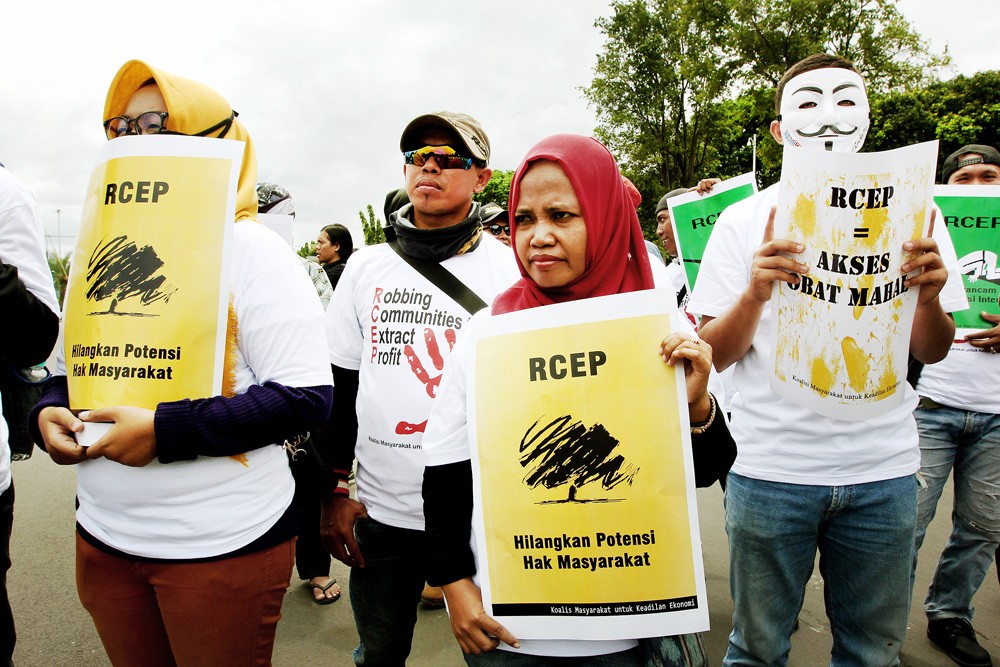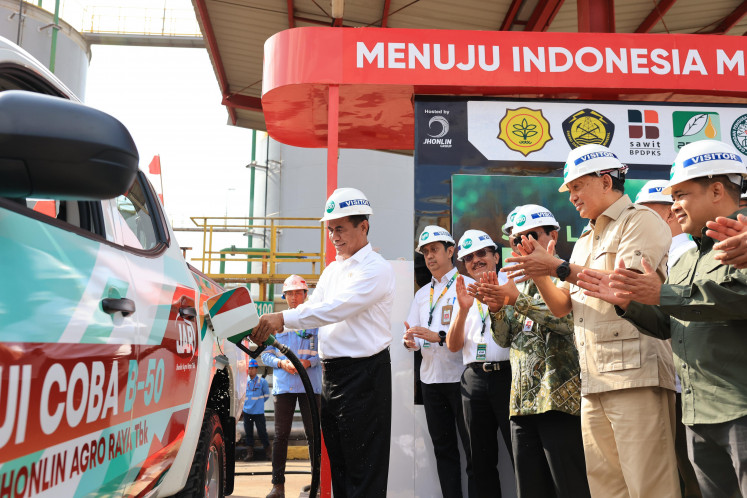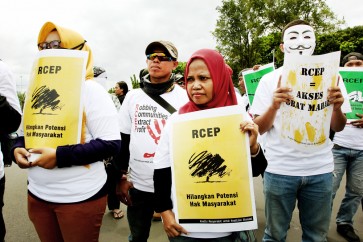Popular Reads
Top Results
Can't find what you're looking for?
View all search resultsPopular Reads
Top Results
Can't find what you're looking for?
View all search resultsRCEP: More relevant now than ever
With the uncertainty around the TPP and an apparent rise in protectionism, ASEAN can lead the way by using RCEP to keep markets open, deepen economic integration and narrow the development gap among the member states.
Change text size
Gift Premium Articles
to Anyone
 NOT FOR US: Protesters under the umbrella of the Indonesian People Coalition for Economic Justice rally in front of Merdeka Palace in Jakarta on Tuesday. They profoundly reject the Regional Comprehensive Economic Partnership (RCEP) negotiation because the clauses, they say, will pave the way for global investors to dominate the economy and harm state interests as well as public welfare. (JP/Bimo Raharjo)
NOT FOR US: Protesters under the umbrella of the Indonesian People Coalition for Economic Justice rally in front of Merdeka Palace in Jakarta on Tuesday. They profoundly reject the Regional Comprehensive Economic Partnership (RCEP) negotiation because the clauses, they say, will pave the way for global investors to dominate the economy and harm state interests as well as public welfare. (JP/Bimo Raharjo)
W
hen United States President Donald Trump called the Trans-Pacific Partnership Agreement (TPP) a “disaster” and vowed to pull out of the agreement as soon as he took office, international media almost instantaneously pronounced the TPP dead.
And in the next breath, they shifted their focus to the less controversial Regional Comprehensive Economic Partnership (RCEP), calling it “China-led” and pitching it as the alternative to the TPP. The impression was that as one was US-led and the other China-led, they must have been competing agreements. Not so.
ASEAN member states involved in the negotiations of both the TPP and RCEP were very mindful that these agreements were complementary, albeit at different levels of scope and ambition. What was more important was that both agreements would ultimately contribute to deeper economic integration of Asia-Pacific, which would come under a Free Trade Area of the Asia-Pacific (FTAAP).
When the FTAAP was mooted by the APEC Business Advisory Council (ABAC), it was not well-received. In fact, at their 2006 APEC Economic Leaders’ Summit in Hanoi, the leaders rejected the proposal. It was only four years later that the APEC leaders gave their nod for concrete steps to realize the FTAAP. And it gained momentum during China’s chairmanship of APEC in 2014 when it was decided that work on the FTAAP would begin in earnest, with the TPP and RCEP serving as building blocks toward this FTAAP goal.
But even as the study on the framework of the FTAAP progresses, it appears that an anti-globalization movement is stirring in the face of Brexit. We have to wait and see if Trump will be able to implement his calls to deal with China and pull out of the North American Free Trade Agreement (NAFTA) and the TPP.
The TPP signatories should rightly be concerned of any agreement that excludes the US and limits economic gains. But it is in this environment that ASEAN and its partners must consolidate and work to deepen economic integration in this region. Focus must be on the opportunities that agreements, such as RCEP, can be brought not just to ASEAN but also to the global economy. As such, it would be in ASEAN’s interest to step up work on RCEP to ensure its conclusion within the next 12 months.
As this is being done, it would be useful to take on board the valuable outcomes from the TPP. First of all, there are important lessons for public engagement now that the discourse on trade negotiations is under greater scrutiny. Parties must explain RCEP to their audiences so that there is an appreciation of its impact and benefits.

















